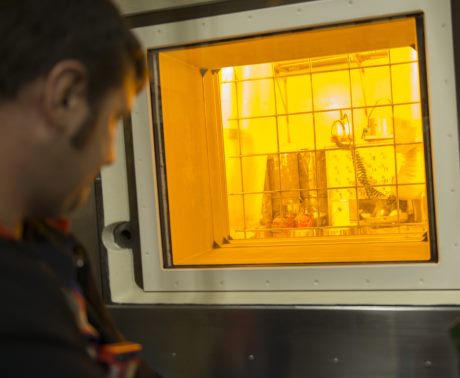An industry-academia research program aims to help develop the next generation of nuclear experts while tackling the UK's national clean-up program.
 |
| The 'Distinctive' initiative will help address "a challenge without a blueprint" (Image: Sellafield Ltd) |
A research program dubbed 'Distinctive' will see the UK's National Nuclear Laboratory (NNL), Nuclear Decommissioning Authority (NDA), Sellafield Ltd and Engineering and Physical Sciences Research Council (EPSRC) working alongside ten universities on thirty separate projects. The academic consortium is led by the University of Leeds and includes the universities of Birmingham, Bristol, Imperial College, Lancaster, Loughborough, Manchester, Sheffield, Strathclyde and University College London.
The initiative follows on from an earlier program known as Diamond. The program's overall value of £8.9 million ($14.7 million) will be underpinned by a £4.9 million ($8.1 million) grant from the EPSRC, supported by financial and in-kind support from the other organisations involved.
The projects forming the Distinctive program will focus on four themes: AGR, Magnox and 'exotic' used fuel; plutonium oxide and fuel residues; legacy ponds and silos wastes; and infrastructure characterisation, restoration and preservation. The work will start next month and will involve a mixture of doctoral and post-doctoral researchers with each project under an industrial supervisor from NNL or Sellafield Ltd. More than half of the projects will be supervised by NNL. Facilities including the NNL's Sellafield-based central laboratory will support the work.
As well as developing technology and fundamental knowledge, a key strand of the program is to develop the subject matter experts of the future, as NDA head of research and development Melanie Brownridge explained. "We hope their skills will be with us for many years ahead," she said, sentiments echoed by Sellafield Ltd research alliance manager Neil Smart who described the task of decommissioning of historic reactors, reprocessing facilities and associated legacy ponds and silos emptying and demolishing some of the most difficult and complex nuclear buildings in the world as "a challenge where there is no blueprint."
VELA, Magnox sign pledge
Meanwhile, the VELA Alliance - a consortium of UK engineering companies AMEC and Jacobs Engineering Group - has joined with Magnox Ltd to pledge their commitment to addressing skills shortages by signing the Engineering Construction Industry Training Board (ECITB) Skills and Training Charter. Together, the companies say they are working to enhance the pool of highly skilled project management personnel to deliver Magnox's decommissioning program across its ten UK sites. In signing the charter, the companies are reinforcing their efforts to retain skills for the nuclear sector and broader engineering construction.
Researched and written
by World Nuclear News




_87299.jpg)
_52351.jpg)








